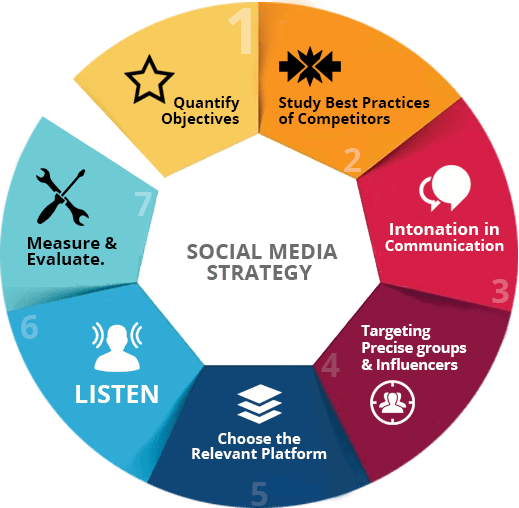Social media has revolutionized the way businesses connect with their audience, offering unparalleled opportunities for engagement, brand building, and customer acquisition. In this comprehensive guide, we’ll explore the world of social media marketing, from its benefits and strategies to best practices and emerging trends, empowering you to leverage the full potential of these dynamic platforms.
Introduction to Social Media Marketing
In today’s digital age, social media marketing has become a cornerstone of successful marketing strategies for businesses of all sizes. It involves leveraging social media platforms to connect with audiences, build brand awareness, and drive desired actions such as website visits, lead generation, and sales. As social media usage continues to soar worldwide, harnessing the power of these platforms has become essential for staying competitive in the marketplace.
Benefits of Social Media Marketing

The benefits of social media marketing are vast and multifaceted, offering businesses numerous advantages in the digital landscape:
Increased Brand Awareness
Social media provides a powerful platform for reaching a broad audience and increasing brand visibility. By regularly engaging with users through content sharing, interactions, and conversations, businesses can expand their reach and attract new followers.
Enhanced Brand Loyalty and Customer Engagement
Social media fosters meaningful connections between brands and their audience, leading to increased loyalty and engagement. By providing valuable content, responding to inquiries promptly, and fostering a sense of community, businesses can cultivate deeper relationships with their customers.
Lead Generation and Sales
Social media platforms offer effective tools and strategies for generating leads and driving sales. From targeted advertising to organic content promotion, businesses can leverage social media to attract potential customers, nurture relationships, and convert leads into loyal patrons.
Improved Customer Insights
Social media provides valuable insights into consumer behavior, preferences, and sentiments. By monitoring social media conversations, analyzing engagement metrics, and gathering feedback, businesses can gain valuable insights to inform product development, marketing strategies, and customer service initiatives.
Types of Social Media Platforms

Social media encompasses a diverse range of platforms, each with its own unique features, audience demographics, and content formats. Some popular social media platforms include:
Facebook
With over 2.7 billion monthly active users, Facebook remains the largest social media platform globally. It offers robust advertising options, business pages, and community-building features.
Instagram
Instagram is a visually-focused platform known for its photo and video sharing capabilities. It is particularly popular among younger demographics and offers various features such as Stories, Reels, and IGTV.
Twitter
Twitter is a microblogging platform that allows users to share short, concise messages known as tweets. It is widely used for real-time updates, news dissemination, and engagement with influencers and brands.
LinkedIn
LinkedIn is a professional networking platform geared towards business professionals and organizations. It offers features such as company pages, job postings, and industry-specific groups.
YouTube
YouTube is the leading video-sharing platform, with billions of users consuming video content daily. It offers opportunities for businesses to share tutorials, product demonstrations, and branded content.
TikTok
TikTok is a short-form video platform known for its viral trends and creative content. It has quickly risen in popularity, particularly among younger audiences, and offers opportunities for brands to showcase their personality and creativity.
Creating a Social Media Strategy

Developing a successful social media strategy requires careful planning, execution, and ongoing optimization. Here are key steps to create an effective social media strategy:
Define Goals and Objectives
Start by defining clear and measurable goals for your social media efforts. Whether it’s increasing brand awareness, driving website traffic, or boosting sales, align your objectives with your overall business goals.
Identify Target Audience
Understand your target audience’s demographics, interests, and pain points to tailor your content and messaging effectively. Use audience insights and market research to create buyer personas and segment your audience accordingly.
Content Creation and Posting Schedule
Develop a content calendar outlining the types of content to be created, posting frequency, and timing. Create a mix of content formats, including images, videos, articles, and user-generated content, to keep your audience engaged.
Engagement and Community Management
Regularly monitor social media channels for mentions, comments, and messages from your audience. Respond promptly to inquiries, address feedback, and engage with users to foster a sense of community and build brand loyalty.
Measurement and Analysis
Track key performance indicators (KPIs) such as engagement metrics, reach, and conversion rates to evaluate the effectiveness of your social media efforts. Use analytics tools to gather insights and adjust your strategy accordingly.
Conclusion
In conclusion, social media marketing offers unparalleled opportunities for businesses to connect with their audience, build brand awareness, and drive desired actions. By developing a well-defined strategy, creating compelling content, and leveraging the latest tools and trends, businesses can harness the power of social media to achieve their marketing objectives and drive sustainable growth in the digital age.
FAQs (Frequently Asked Questions)
- What is social media marketing?
Social media marketing involves leveraging social media platforms to connect with audiences, build brand awareness, and drive desired actions such as website visits, lead generation, and sales. - Why is social media marketing important for businesses?
Social media marketing offers numerous benefits, including increased brand awareness, enhanced customer engagement, lead generation, and valuable customer insights. - How can businesses create an effective social media strategy?
To create an effective social media strategy, businesses should define clear goals and objectives, identify their target audience, develop a content calendar, engage with their audience, and measure and analyze performance metrics. - What types of content perform well on social media?
Visual content, video content, user-generated content, hashtag campaigns, and influencer partnerships tend to perform well on social media, capturing attention and driving engagement. - What are some emerging trends in social media marketing?
Emerging trends in social media marketing include the rise of ephemeral content, social commerce, augmented reality (AR) experiences, and an increased focus on privacy and data security.




